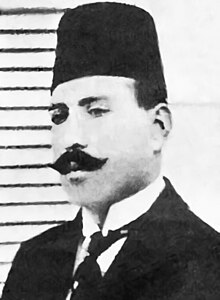Nasib al-Bakri
| Nasib al-Bakri | |
|---|---|

Bakri, early 1920s
|
|
| Minister of Justice | |
|
In office 24 February 1939 – 5 April 1939 |
|
| President | Bahij al-Khatib |
| Prime Minister | Lutfi al-Haffar |
| Preceded by | Abd al-Rahman al-Kayyali |
| Succeeded by | Khalid al-Azm |
| Minister of National Economy and Agriculture | |
|
In office 4 April 1941 – 21 September 1941 |
|
| President | Hashim al-Atassi |
| Prime Minister | Khalid al-Azm |
| President of the People's Party | |
|
In office 1954 – April 1957 |
|
| Preceded by | Nazim al-Kudsi |
| Succeeded by | Maarouf al-Dawalibi |
| Parliamentary Deputy of Damascus | |
|
In office 1932–1946 |
|
| Personal details | |
| Born | 1888 Damascus, Ottoman Empire |
| Died | 1966 (aged 77–78) |
| Nationality | Syrian |
| Political party |
National Bloc (1928–1946) People's Party (1946 – April 1957) |
Nasib al-Bakri (1888–1966) was a Syrian politician and nationalist leader in the first half of the 20th century. He played a major role in establishing al-Fatat, an underground organization which sought the independence and unity of the Ottoman Empire's Arab territories. As the chief envoy between al-Fatat and the Hejaz-based Hashemites, al-Bakri became a close aide to Emir Faisal when the latter became King of Syria following the success of the 1916 Arab Revolt. Al-Bakri opposed the establishment of the French Mandate of Syria and became one of the chief commanders of the Great Syrian Revolt, leading the rebels' brief capture of Damascus. He escaped a death warrant in Syria in 1927, but returned the following year after being amnestied.
Al-Bakri served as a representative of Damascus in the Syrian Parliament between 1932 and 1946. He was one of the main coordinators of the 1936 general strike and became Vice President of the National Bloc. He defected to join Abd al-Rahman Shahbandar's party in 1938. During the post-independence period, al-Bakri was appointed Syria's ambassador to Jordan but resigned in 1953 in protest against Adib al-Shishakli's seizure of power. The following year, he became President of the People's Party, but retired in 1957.
Nasib was born in Damascus in 1888 to father 'Ata al-Bakri. Nasib was the second oldest of five sons. 'Ata was an influential official in the city and district councils of Damascus between the 1890s and 1914, and was one of the most prominent Arabs to serve in the imperial Ottoman court of Sultan Abdul Hamid II in Constantinople. The al-Bakri family were Sunni Muslims and claimed descent from the Islamic prophet Muhammad. They were landowners, possessing lands, homes and commercial venues in their native al-Shaghour quarter and in Qaboun, a village in the Ghouta countryside of Damascus. They also owned land in Jaramana, a Druze village outside of Damascus and maintained good relations with the local Druze chiefs.
...
Wikipedia
